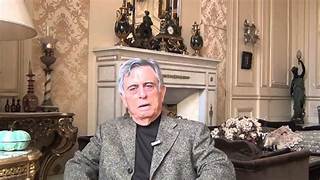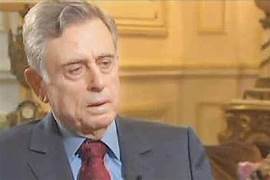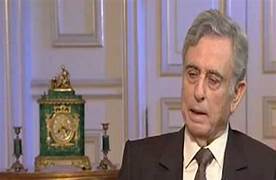Hezbollah is not taken into account in major conflicts.
Inside his home near the Arc de Triomphe, in the heart of the French capital, Paris, Al-Massae met Abdel Halim Khaddam—one of the most knowledgeable figures on the secrets of the Syrian file. He was the close associate of both Presidents Hafez and Bashar al-Assad, serving as their vice president and foreign minister, entrusted with two of the most sensitive and complex dossiers in the Middle East: the Lebanese file and the Iraqi file.
Sitting in Al-Massae‘s chair, Abdel Halim Khaddam revealed secrets about his relationship with the regime of both father and son, which he described as “deeply corrupt and authoritarian.” He spoke of Hafez al-Assad’s obsession with passing power to his family and how Bashar al-Assad sought his company, even criticizing his father’s regime while addressing him as “Uncle Abdel Halim.” He also recalled the moment he found himself president of the republic after Hafez al-Assad’s death and the behind-the-scenes maneuvering to amend the constitution so that Bashar could take power. He explained why he decided to leave Syria and become the fiercest opponent of a regime he accused of planning to establish a mini-state along the coast, where the Alawite majority, to which the Assad family belongs, resides.
Khaddam also spoke about his relationship with King Hassan II and Mehdi Ben Barka, as well as how Syria’s stance on the Western Sahara issue evolved. He claimed that Algerian President Abdelaziz Bouteflika never truly abandoned the ideology of his predecessor, Houari Boumédiène.
– Given your call for foreign intervention in Syria, it seems you underestimate the regime’s allies in the region. Wouldn’t such intervention ignite a war involving Iran, Hezbollah, and others?
First, Hezbollah cannot ignite a war in the region. If the Syrian regime wanted to eliminate Hezbollah, it could do so within hours. Hezbollah is just a few thousand Shia Muslims connected to Iran. Of course, the party has the support of the majority of the Shia community in Lebanon, but that community does not represent all Muslims in Lebanon, nor does it represent all of Lebanon. In any case, Hezbollah is not a decisive factor in major conflicts.
– And what about Iran?
Iran cannot wage a war beyond its national borders because it knows that doing so would give the West an opportunity to destroy it. The Iranian leadership is known for its cunning and strategic thinking—they calculate every move carefully. That’s why the prospect of a war erupting in the region remains unlikely.
– When calling for foreign intervention in Syria, do you not recall what happened in Libya and the devastating effects of NATO’s intervention, which left Libya divided?
Had there been no foreign intervention in Libya, Muammar Gaddafi would have continued killing Libyans until the last Libyan, as he himself declared in his speeches. Foreign intervention saved the Libyan people from Gaddafi’s crimes. However, what happened afterward was a result of Libya’s tribal structure, not the intervention itself. All the tribes currently fighting in Libya had previously called for foreign intervention. This was a grave mistake by the current Libyan leadership, which failed to foresee the severe consequences of these conflicts—ones that Libya may not be able to escape from for decades. Therefore, every Arab who cares about Libya’s unity should call on Libyans to reconcile, unite, and transition to a new political phase—one based on democracy—moving away from tribal disputes and toward political competition.
– Let’s return to Syria. Who are the people encouraging Bashar al-Assad to continue his rule of violence and oppression?
There is a group surrounding Bashar al-Assad that justifies his actions, but this group does not actually control him. By nature, Bashar al-Assad is indecisive. Someone presents him with an idea, and he agrees; then, two hours later, another person suggests the opposite, and he follows that instead. In other words, he lacks strategic vision and the maturity of a statesman. Like any dictator, he needs people who can frame crime as victory and corruption as wealth accumulation. While it is true that reports are presented to him, he reacts impulsively to them.
– Can you name individuals who influence and control Bashar al-Assad?
No one controls Bashar al-Assad or his decisions. He is in a pathological psychological state—highly indecisive, easily influenced, quick to anger, and prone to sudden reversals.
– Is it true that Bashar al-Assad was receiving treatment for a psychological illness before his father’s death?
I have no information on that. I know he was in London, but whether it was for studies or medical treatment, I cannot say.
– Based on your psychological assessment of Bashar al-Assad—his quick temper, indecisiveness, and impulsiveness—can he be considered mentally ill?
He is immature. Let me give you an example: when he attends an Arab summit and delivers a speech, he speaks as if he is lecturing and guiding the Arab leaders, without realizing that each leader has their own political considerations and calculations. Leaders gather to discuss political issues and find solutions, not to be taught. This is the nature of all dictators—they behave as if they are preachers. And there is no dictator who does not suffer from a psychological disorder.
– You were close to both Hafez and Bashar al-Assad. Who was more ruthless?
In practice, Hafez al-Assad is still ruling Syria from his grave. Bashar al-Assad follows his father’s footsteps in everything. Hafez was willing to do anything—no matter how criminal—to maintain his grip on power, and Bashar inherited that mindset. However, Hafez operated in a different era, when the regional and international climate provided him with a degree of protection. The Hama massacre happened, and not a single Arab or foreign country issued a statement about it. Bashar, on the other hand, faces a different reality. No self-respecting world leader has refrained from condemning him and calling for his departure.
– You accused Bashar al-Assad of planning to divide Syria. How so?
In the 1920s, when France had a mandate over Syria, it divided the country into five mini-states: a Damascus state, a Jabal al-Druze state, an Aleppo state, a Latakia state on the coast, and a state in the Sanjak of Alexandretta, which was then part of Syria. The Latakia state even had a president, Aziz Hwaish, and a flag featuring a white cloth with a sun in the middle. However, this state did not last long because the Syrian people themselves overthrew it. Many Alawites were against this state because they wanted unity with the Syrian homeland.
The idea of dividing Syria resurfaced during the Ba’ath Party crisis in 1981–1982, amid the conflict between Hafez al-Assad and his brother Rifaat. Some of Rifaat’s inner circle considered establishing an Alawite state.
– When exactly did this idea emerge?
Perhaps in 1983 or 1984.
– So, these individuals planned to divide Syria between the two brothers by carving out an Alawite state for Rifaat al-Assad?
Yes, that was Rifaat’s vision. When Hafez al-Assad learned of it, he was furious. His ambition extended beyond Syria—he aspired to lead a greater Arab state. His rhetoric always centered on a grand Arab nation where Syria would play a pivotal role.
– Did Hafez al-Assad truly see himself in that role?
Yes, absolutely. That’s why he took a decisive stance, which ultimately led to Rifaat’s exile from Syria. The idea of dividing Syria and establishing an Alawite state on the coast has resurfaced, but if a referendum were held in the coastal region today, you would find that there is no majority in favor of secession from the Syrian homeland.



